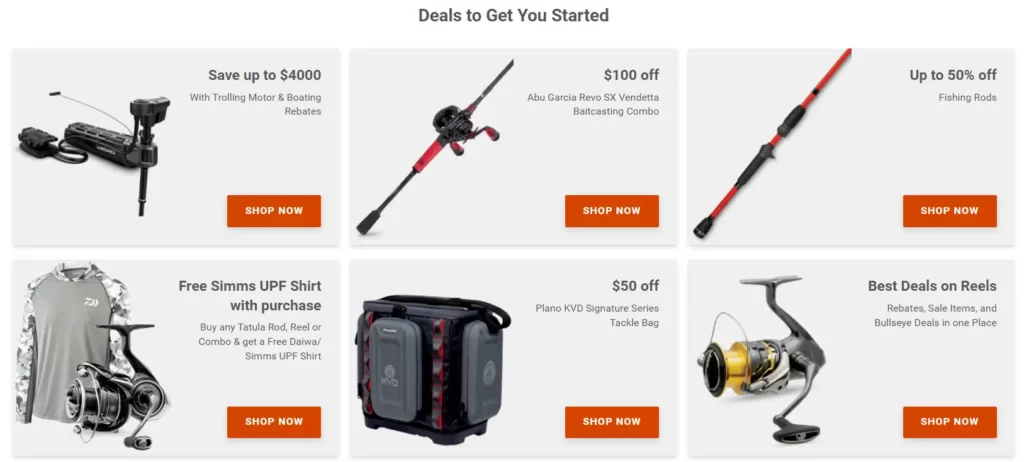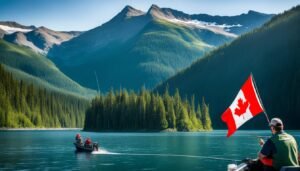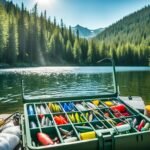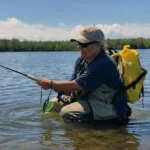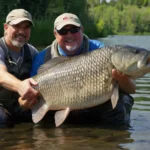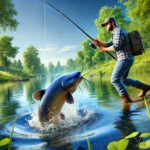Explore Canada's Ultimate Fishing, Hunting, and Wildlife Adventures

Fishing Licenses in US: Your Essential Guide
Table of Contents
Fishing licenses are a must-have for anyone looking to enjoy the thrill of angling in the waters of the United States.
Whether you’re a resident or a tourist visiting this vast and diverse country, understanding the rules and regulations surrounding fishing licenses is crucial.
In this comprehensive guide, we’ll cover everything you need to know about fishing licenses in the US, from their importance to how and where to purchase them, the different types available, eligibility requirements, state-by-state license costs, fishing regulations, and much more.
Disclosure: When you purchase a service or a product through our links, we sometimes earn a commission, at no extra cost to you.
By the end, you’ll be fully equipped to navigate the world of fishing licenses and make the most of your angling adventures in the US.
Key Takeaways:
- Fishing licenses are a legal requirement for anglers in the US
- Understanding the importance of fishing licenses in conservation and supporting fishing communities
- Purchasing fishing licenses online, locally, or via phone services
- Exploring the different types and options of fishing licenses available
- Eligibility criteria and requirements for obtaining a fishing license
Understanding the Importance of Fishing Licenses
Fishing licenses are not just a legal requirement but also play a crucial role in conservation efforts and the sustainable management of fish populations. By obtaining a fishing license, anglers contribute to the preservation of aquatic ecosystems and support the economic viability of fishing communities.
The Role of Fishing Licenses in Conservation
Fishing licenses serve as a crucial tool for monitoring and regulating fishing activity. They help fishing authorities ensure that fishing is conducted responsibly and sustainably, minimizing the impact on fish populations and their habitats. By setting catch limits, size restrictions, and specific fishing seasons, fishing licenses contribute to the conservation of fish species and the overall health of aquatic ecosystems.
Economic Impact of Angler Contributions
When anglers purchase fishing licenses, they contribute to important conservation projects and fishery management initiatives. The fees collected for fishing licenses are often used to fund habitat restoration, fish stocking programs, and research projects aimed at enhancing the sustainability of fish populations. Additionally, the economic impact of angler contributions, including license fees, supports local and national fishing communities by sustaining jobs, businesses, and recreational opportunities.
Federal and State Partnerships in Fishery Management
Fishery management is a complex undertaking that requires collaboration between federal and state agencies, as well as input from stakeholders such as anglers and conservation organizations. Fishing licenses provide a platform for such partnerships, enabling the development and enforcement of regulations that protect fish populations. Through these cooperative efforts, fishery management goals are established, and strategies are implemented to ensure the long-term health and viability of fish species and their habitats.
How to Purchase Your Fishing License
Purchasing a fishing license in the US is a straightforward process, and there are several convenient options available to anglers. Whether you prefer the ease of online registration, the personal touch of a local purchase, or the simplicity of phone services, you can find a method that suits your needs. Let’s explore each option in detail.
Online License Registration Process
Online registration is a popular choice for anglers who prefer a hassle-free experience. Many states offer online platforms where you can apply for and purchase your fishing license from the comfort of your own home. The process is simple and user-friendly, typically requiring you to provide your personal information, select the type of fishing license you need, and make the necessary payment. Once your registration is complete, you will often receive a digital copy of your fishing license that you can print or store electronically for easy access.
Disclosure: When you purchase a service or a product through our links, we sometimes earn a commission, at no extra cost to you.
Where to Buy Your License Locally
If you prefer a more traditional approach or need your fishing license immediately, purchasing it locally is a convenient option. You can visit designated retail establishments such as sporting goods stores or fishing tackle shops in your area to obtain your fishing license. These local retailers are authorized to sell fishing licenses and can provide you with the necessary guidance and assistance throughout the process. Make sure to bring any required identification and payment method when visiting these establishments.
Utilizing Phone Services for License Purchase
For anglers who prefer a personal touch or may not have access to online platforms, phone services offer a convenient alternative. Some states provide phone services that allow you to call the relevant authorities and complete your fishing license purchase over the phone. A knowledgeable representative will guide you through the process, verifying your information, and assisting with any questions or concerns you may have. This option provides flexibility for those who prefer a more direct interaction when obtaining their fishing license.
Fly to Your Canadian Fishing Paradise
Book cheap flights to Canada's best fishing spots!
One search, all flights
Find the best deals to your favorite fishing spots
Kiwi.com Guarantee
Travel worry-free with our protection
Trusted by millions
Join anglers booking cheap flights with ease
Disclosure: When you purchase a service or a product through our links, we sometimes earn a commission, at no extra cost to you.

Fishing Licenses in US: Types and Options
Fishing licenses in the US come in various types and options to cater to the diverse needs and preferences of anglers. The types of fishing licenses available may include different categories based on factors such as residency, duration, and fishing location. Options can range from short-term licenses for occasional anglers to annual licenses for avid fishermen. Some states may also offer lifetime licenses for those who want long-term access to fishing activities. Understanding the different types and options available will help anglers choose the most suitable fishing license for their needs.
Whether you’re a resident or a tourist visiting the US, there are fishing licenses designed to meet your specific requirements. Let’s take a closer look at the different types and options you can consider.
Short-term licenses: These licenses are ideal for occasional anglers or those who don’t fish frequently. They typically range from 1 day to 7 days and provide temporary access to fishing in specific locations.
Annual licenses: If you’re a regular or avid fisherman, an annual license is a great option. It allows you to fish throughout the year without the need to renew your license frequently. Annual licenses often provide access to multiple fishing locations within the state.
Lifetime licenses: For those who plan to fish for a lifetime, some states offer lifetime fishing licenses. These licenses provide long-term access to fishing activities and may also have additional benefits such as exemption from future fee increases.
It’s important to note that specific types and options may vary depending on the state you’re in. Make sure to check with the relevant fishing authorities or visit their official websites to get detailed information on the types of fishing licenses available in your area.
By understanding the types and options of fishing licenses in the US, you can select the license that best suits your needs and ensures a memorable fishing experience.
Eligibility and Requirements for a US Fishing License
When it comes to obtaining a fishing license in the US, it’s important to understand the eligibility criteria and requirements set by each state. These can vary depending on factors such as age and residency. Let’s take a closer look at what you need to know.
Understanding Age and Residency Restrictions
Age restrictions for fishing licenses vary from state to state. Some states have a minimum age requirement for anglers to be eligible for a fishing license, while others may not impose any age restrictions. It’s crucial to check the specific regulations in the state where you plan to fish to ensure compliance.
In addition to age restrictions, residency requirements may also apply. Some states require anglers to be residents of the state in order to obtain a fishing license. Non-residents may have the option to purchase a non-resident fishing license, but this will depend on the policies of each individual state. Make sure to clarify the residency requirements before applying for a fishing license.
License Duration: From Short-Term to Lifetime
When obtaining a fishing license, it’s essential to consider the duration that best suits your needs. Fishing licenses in the US come in various durations, ranging from short-term options to long-term licenses.
Short-term licenses are ideal for anglers who plan to fish for a limited period of time, such as a day or a week. These licenses are often available for tourists or occasional anglers who don’t require year-round access to fishing.
On the other hand, long-term options, such as annual or lifetime licenses, cater to avid fishermen who want to enjoy fishing throughout the year or for a lifetime. Lifetime licenses provide anglers with the convenience of having a fishing license for as long as they continue to fish.
It’s important to consider your fishing habits and frequency when choosing the duration of your fishing license. This way, you can ensure that you have the appropriate license to meet your needs.
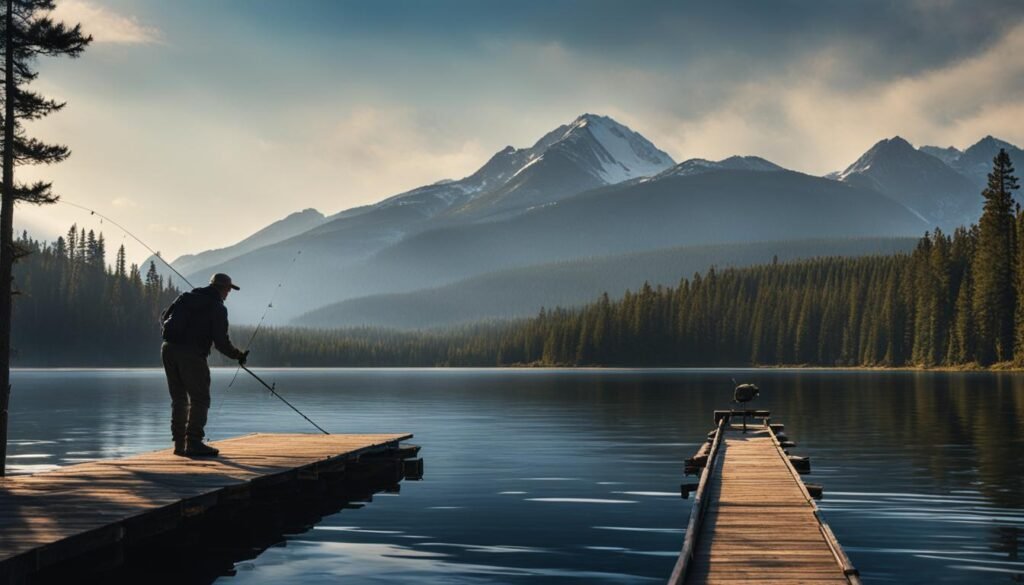
Now that you understand the eligibility and requirements for a fishing license in the US, you’ll be better prepared to navigate the process. Remember to familiarize yourself with the specific regulations of the state where you plan to fish and choose the license duration that aligns with your fishing preferences. Happy fishing!
State-by-State Guide: Fishing License Costs
When it comes to fishing licenses in the US, the cost can vary significantly from state to state. Each state has its own fee structure, and it’s important for anglers to understand the fishing license costs associated with their desired fishing location.
To help you navigate the fees, we’ve created a comprehensive state-by-state guide detailing the fishing license costs for each state.

| State | Resident License Fees | Non-Resident License Fees |
|---|---|---|
| Alabama | $13.30 – $53.20 | $29.25 – $586.50 |
| Alaska | $29 – $145 | $85 – $145 |
| Arizona | $37 – $160 | $55 – $160 |
| Arkansas | $10 – $50 | $40 – $325 |
| California | $7.01 – $138.60 | $15.12 – $141.84 |
| Colorado | $35 – $131.75 | $97.75 – $368.25 |
| Connecticut | $28 – $55 | $55 – $96 |
| Delaware | $8.50 – $20 | $20 – $40 |
| Florida | $17 – $79 | $17 – $79 |
| Georgia | $15 – $50 | $25 – $70 |
| Hawaii | Free – $10 | $10 – $35 |
| Idaho | $30.50 – $98.25 | $98.25 – $251.75 |
| Illinois | $15 – $29 | $31.50 – $57.75 |
| Indiana | $17 – $42 | $35 – $62 |
| Iowa | $22 – $47 | $48 – $112 |
| Kansas | $27.50 – $42.50 | $52.50 – $97.50 |
| Kentucky | $23 – $55 | $55 – $95 |
| Louisiana | $9.50 – $60 | $60 – $90 |
| Maine | $25 – $64 | $64 – $111 |
| Maryland | $20.50 – $40.50 | $40.50 – $60.50 |
| Massachusetts | $27.50 – $40 | $37.50 – $64.50 |
| Michigan | $26 – $76 | $76 – $216 |
| Minnesota | $22 – $44 | $44 – $76 |
| Mississippi | $10 – $42.29 | $30 – $60 |
| Missouri | $12 – $42 | $42 – $90 |
| Montana | $21 – $99 | $86 – $111 |
| Nebraska | $38 – $95 | $76 – $142 |
| Nevada | $29 – $69 | $69 – $129 |
| New Hampshire | $11 – $45 | $28 – $63 |
| New Jersey | $22.50 – $34 | $34 – $54 |
| New Mexico | $25 – $56 | $56 – $140 |
| New York | $25 – $50 | $50 – $100 |
| North Carolina | $20 – $40 | $40 – $80 |
| North Dakota | $16 – $38 | $45 – $105 |
| Ohio | $19 – $40 | $40 – $84 |
| Oklahoma | $25 – $55 | $55 – $105 |
| Oregon | $41 – $69 | $103.50 – $138 |
| Pennsylvania | $22.90 – $52.90 | $52.90 – $102.90 |
| Rhode Island | $18 – $35 | $35 – $70 |
| South Carolina | $10 – $35 | $35 – $75 |
| South Dakota | $28 – $68 | $67 – $121 |
| Tennessee | $34 – $99 | $50 – $166 |
| Texas | $30 – $68 | $58 – $132 |
| Utah | $34 – $83 | $75 – $125 |
| Vermont | $26 – $52 | $52 – $92 |
| Virginia | $23 – $40 | $47 – $96 |
| Washington | $29.50 – $84.50 | $84.50 – $124.65 |
| West Virginia | $19 – $35 | $37 – $69 |
| Wisconsin | $20 – $65 | $50 – $165 |
| Wyoming | $27 – $102 | $92 – $180 |
This table should give you a comprehensive overview of the fishing license fees across the United States.
Remember, these fees are approximate and subject to change, so it’s advisable to check the most current information with the state’s respective authority.
By referring to this guide, you can plan your fishing trips accordingly and budget for the fishing license fees associated with your chosen destination.
Remember, obtaining a fishing license is not only a legal requirement but also contributes to the conservation and management of fish populations.
So, make sure to purchase your fishing license before casting your line and enjoy a fulfilling fishing experience.
Navigating Fishing Regulations and Conservation Laws
Understanding and adhering to fishing regulations and conservation laws is crucial for ensuring responsible fishing practices and protecting fish populations, their habitats, and the overall biodiversity of aquatic ecosystems. In this section, we will explore legal fishing practices, species limits, and the significance of fishing laws in maintaining the health and sustainability of our aquatic environments.
Legal Fishing Practices and Species Limits
When it comes to fishing, following legal practices is essential to minimize the impact on fish populations and their ecosystems. Fishing regulations often specify the fishing methods that are permitted, such as angling, netting, or trapping. It is important to familiarize yourself with the specific rules for your fishing location to ensure that you are using legal techniques.
Another important aspect of fishing regulations is species limits, which define the number and size of fish that can be caught and kept. These limits are designed to prevent overfishing, protect vulnerable species, and maintain a balanced ecosystem. Adhering to species limits helps to preserve fish populations and ensure their future sustainability.
For example, some regulations may specify a minimum size limit for certain fish species, ensuring that young or undersized fish have a chance to reproduce before being caught. Other regulations may impose catch limits, setting a maximum number of fish that can be harvested per angler or per day. These limits are put in place to prevent the depletion of fish populations and support the long-term health of our waters.
The Significance of Fishing Laws on Biodiversity
Fishing laws play a critical role in maintaining biodiversity in aquatic ecosystems. By regulating fishing activities, authorities can protect not only target species but also the delicate balance of the entire ecosystem.
Conservation laws often focus on protecting vulnerable or endangered species, as well as preserving essential habitats such as spawning areas or fragile ecosystems. By imposing strict regulations on fishing practices, authorities can help safeguard these important components of biodiversity.
Furthermore, fishing laws contribute to the overall health and productivity of aquatic ecosystems. By managing fishing activities, authorities can prevent overfishing, which can disrupt the food chain and lead to ecological imbalances. This, in turn, helps maintain the abundance and diversity of fish species, promoting a thriving ecosystem that benefits both marine life and those who rely on it for recreation and livelihood.
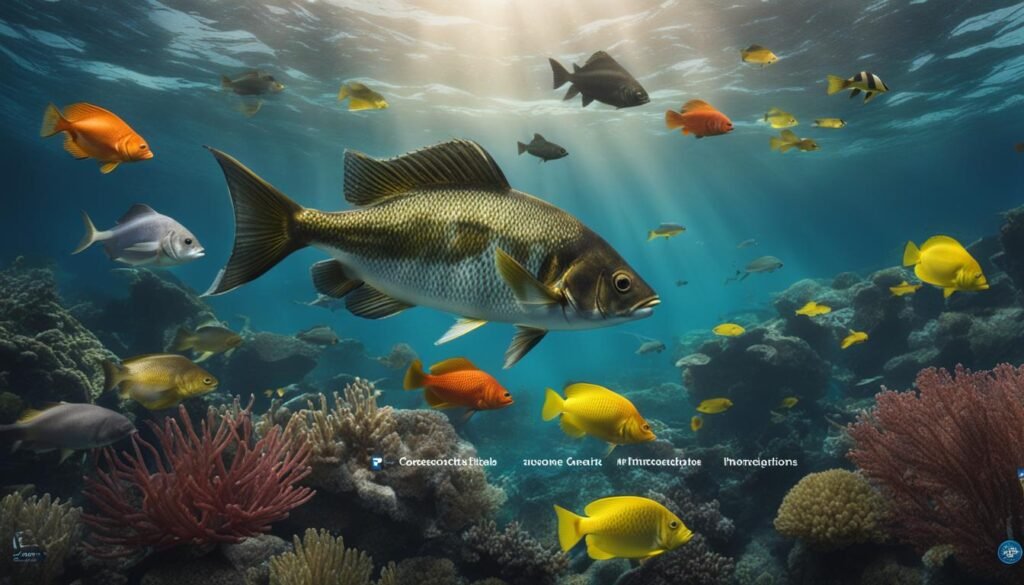
Benefits of Obtaining a Fishing License
Obtaining a fishing license comes with numerous benefits for anglers. One of the key benefits is gaining access to fishing resources and recreational areas that may be restricted to licensed anglers. By obtaining a fishing license, you can explore a wide range of fishing spots, from pristine lakes to scenic rivers and coastal shores. Whether you prefer freshwater or saltwater fishing, a fishing license opens up a world of opportunities to enjoy your favorite pastime in diverse and beautiful locations.
Not only does a fishing license grant you access to a variety of resources, but it also plays a vital role in supporting local and national fishing communities. Fishing license fees contribute to funding conservation efforts, fisheries management, and the maintenance of fishing infrastructure. By obtaining a fishing license, you are directly supporting the sustainability of fish populations and their habitats. Additionally, fishing licenses help in sustaining the economy of fishing communities by providing income for local businesses, guides, and charters.
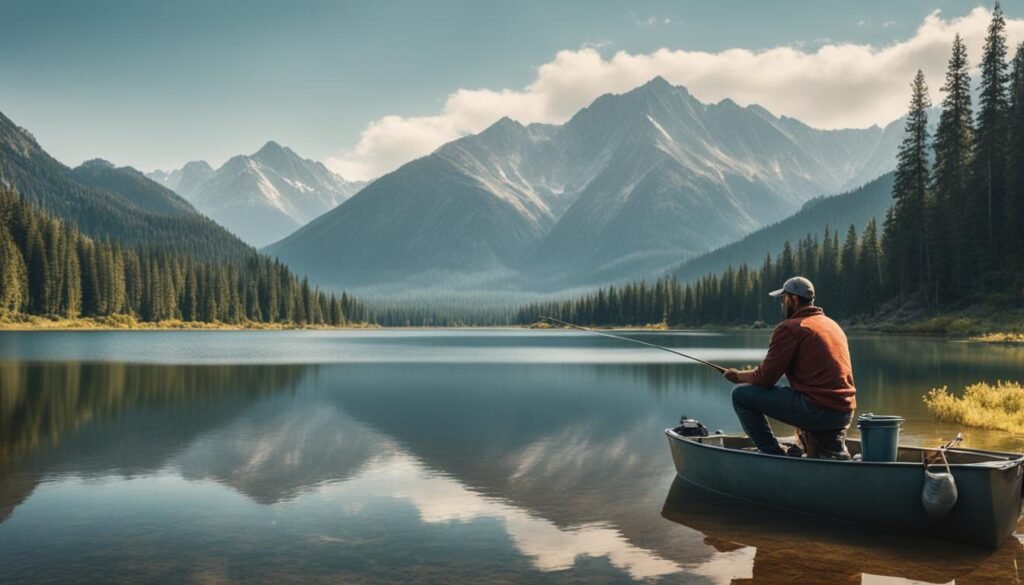
Furthermore, fishing licenses enable proper regulation and management of fishing activities, ensuring the long-term health of fish populations. These licenses help authorities monitor fishing practices, enforce catch limits, and implement conservation measures. By obtaining a fishing license and following the regulations, you are actively participating in the preservation and restoration of our aquatic ecosystems.
In summary, obtaining a fishing license extends beyond legal compliance – it grants you the privilege of accessing abundant fishing resources and contributes to the sustainability of fishing communities. So, embrace the benefits of a fishing license, support conservation efforts, and enjoy the rewarding experience of fishing in the United States.
Fishing Licenses for Tourists: Non-Resident Options
If you’re a tourist visiting the US and you want to try your hand at fishing, you’re in luck! Even if you’re not a resident of the country, there are non-resident fishing license options available to you. These licenses allow tourists like you to experience the thrill of fishing in US waters.
Non-resident fishing licenses typically come with their own set of requirements and regulations. The specific options and fees can vary depending on the state you’re in and the type of fishing license you choose.
To obtain a non-resident fishing license, you may need to provide proof of identification, such as a passport or driver’s license. Some states may also require you to have a social security number or provide a temporary identification number for verification purposes.
It’s important to check the fishing regulations and licensing requirements of the state you plan to visit. This will ensure that you’re compliant with the local laws and regulations and can enjoy your fishing experience without any issues.
If you’re unsure about the specific non-resident fishing license options and requirements for the state you’re planning to visit, you can refer to the respective state’s wildlife or fish and game department website. They will have all the necessary information, including fees, license duration, and any additional permits that may be required.
Remember, obtaining a fishing license as a tourist not only allows you to legally fish in US waters but also contributes to the conservation and management of fish populations. It’s a win-win situation that allows you to enjoy your fishing experience while supporting the sustainable management of our natural resources.
So, if you’re a tourist looking to cast your line in US waters, make sure to explore the non-resident fishing license options available to you. It’s your opportunity to create unforgettable fishing memories while playing your part in preserving our aquatic ecosystems.
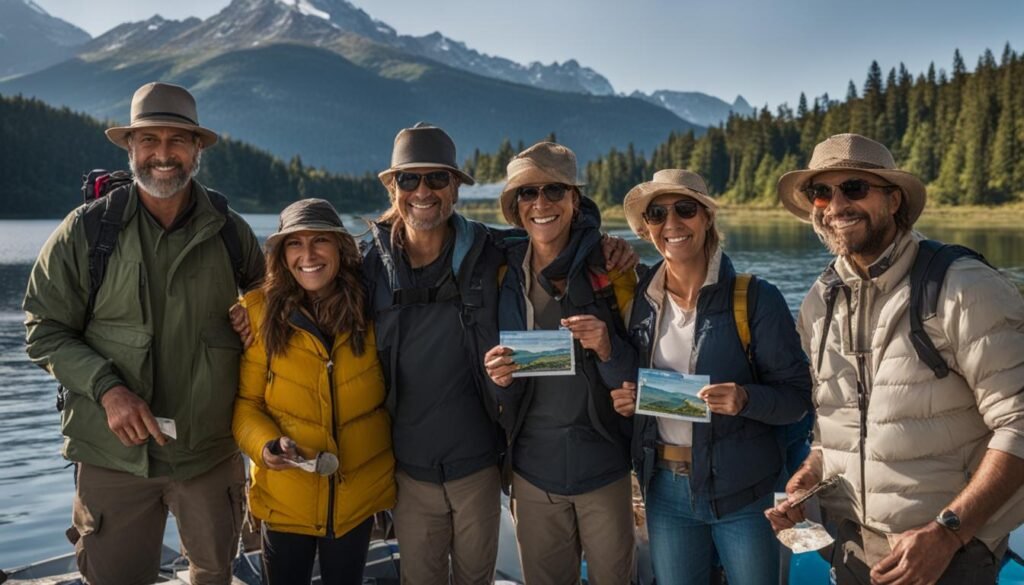
Your First Fishing Trip: What to Know
Going on your first fishing trip can be an exciting adventure. Whether you’re planning to cast a line off the shoreline or embark on a boat fishing expedition, there are a few key things you need to know to make your experience enjoyable and successful.
Fishing Gear and Tackle Essentials
Before heading out on your fishing trip, it’s important to have the right gear and tackle. Here are some essential items every angler should have:
- Rod and reel: Choose a fishing rod and reel combination suitable for the type of fishing you plan to do. There are different options available, such as spinning, baitcasting, or fly fishing setups.
- Fishing line: Select the appropriate fishing line based on the type of fish you want to catch and the fishing environment. Monofilament, fluorocarbon, and braided lines are commonly used.
- Terminal tackle: This includes hooks, sinkers, bobbers, and swivels. The size and type of terminal tackle will depend on the fish species and fishing technique you’ll be using.
- Bait and lures: Carry a variety of bait and lures to attract different types of fish. Worms, minnows, artificial bait, and lures like spoons, jigs, and crankbaits are popular choices.
- Tackle box: Keep all your gear organized and easily accessible in a tackle box. This will help you find what you need quickly while on the water.
- Sunscreen and protective clothing: Protect yourself from the sun’s rays by wearing sunscreen, a hat, sunglasses, and lightweight, breathable clothing. It’s also a good idea to bring rain gear in case of unexpected weather changes.
Remember to check local regulations and restrictions regarding bait and tackle usage to ensure compliance with fishing rules and regulations in your chosen fishing location.
Choosing the Right Location for Fishing
When planning your first fishing trip, it’s important to choose the right location. Here are some factors to consider:
- Type of fish: Determine the type of fish you want to catch. Some fish species prefer freshwater lakes and rivers, while others are found in saltwater coastal areas.
- Accessible fishing spots: Consider the accessibility of the fishing spot. Is it easily reachable by car or do you need to hike in? This will help you plan your transportation and prepare accordingly.
- Fishing season: Research the fishing season for your target fish species. Some species have specific seasons when they are more active and easier to catch.
- Local knowledge: Tap into local knowledge by talking to experienced anglers or visiting bait and tackle shops in the area. They can provide valuable information about hotspots, fishing techniques, and current fishing conditions.
By selecting the right location, you increase your chances of catching fish and enjoying a rewarding fishing experience.
Having the right fishing gear essentials and choosing the right location are crucial elements for a successful first fishing trip. With these preparations in place, you can embark on your fishing adventure with confidence and excitement. Happy fishing!
Getting Started with Freshwater Fishing
Freshwater fishing is a popular activity in the US, offering anglers the opportunity to catch a variety of fish species in lakes, rivers, and ponds. If you’re new to freshwater fishing and want to get started, this guide will provide you with the basic information you need to feel confident and prepared for your fishing adventures.
When it comes to freshwater fishing, understanding the right techniques and using the proper equipment is crucial. Here are some key points to keep in mind:
- Choose the right fishing rod and reel: Selecting the right fishing rod and reel combination for freshwater fishing is essential. There are different types of rods and reels available, each suited for specific fishing techniques and target fish species.
- Learn basic casting techniques: Casting is an essential skill in freshwater fishing. Practice different casting techniques, such as overhead casting and sidearm casting, to improve your accuracy and distance.
“When you’re on the water, take your time to observe and learn from experienced anglers. They often have valuable insights and tips that can enhance your fishing skills.”
- Understand the habits of common freshwater fish species: Familiarize yourself with the behavior and feeding patterns of common fish species found in freshwater bodies. This knowledge will help you choose the right bait and location for your fishing expedition.
- Practice catch and release: To contribute to the conservation of fish populations and maintain the health of freshwater ecosystems, practice catch and release whenever possible. Handle fish with care and release them back into the water unharmed.
- Follow local fishing regulations: Different states and regions may have specific fishing regulations in place, including size limits, catch limits, and fishing seasons. Stay informed and ensure you comply with these regulations to protect fish populations and preserve the integrity of the ecosystem.
By following these basic guidelines, you can start your freshwater fishing journey with confidence. Remember, fishing is not just about catching fish; it’s about immersing yourself in nature and enjoying the adventure.
Boat Registration and Licensing Requirements
As an angler who owns a boat, it’s important to understand the boat registration and licensing requirements in addition to obtaining a fishing license. These requirements ensure that you comply with the necessary regulations and can enjoy fishing from your boat legally.
Differences Between Fishing and Boating Licenses
It’s essential to differentiate between fishing licenses and boating licenses. A fishing license grants you the legal right to engage in fishing activities, while a boating license focuses on your competence as a boat operator.
A fishing license permits you to fish in public waters, while a boating license demonstrates your knowledge of boating safety rules and regulations. Depending on your location, you may be required to have both licenses to fish from your boat.
State-Specific Information for Boat Owners
Each state has its own specific requirements and regulations for boat owners. It’s crucial to familiarize yourself with the state-specific information relevant to boat owners and anglers. This information may include additional permits or regulations that apply specifically to fishing from a boat, such as restrictions on fishing in certain areas or seasonally.
Furthermore, some states may require boat owners to display visible registration numbers and stickers on their boats to indicate that they have met the registration requirements. Failure to comply with these regulations can result in penalties and fines.
To ensure that you are in compliance with the necessary regulations, research and familiarize yourself with the boat registration and licensing requirements specific to your state. This knowledge will help you enjoy your fishing experiences from your boat while adhering to the regulations designed to protect both the environment and other boaters.
Practicing Responsible Fishing and Boating
Responsible fishing and boating practices play a crucial role in maintaining the health and sustainability of aquatic ecosystems. As anglers and boaters, it is our responsibility to preserve these fragile environments for future generations. By following catch and release guidelines and employing proper techniques, we can ensure the survival of fish populations and contribute to the overall conservation effort.
Catch and Release Guidelines and Techniques
Catch and release is a valuable practice that allows anglers to enjoy fishing while minimizing the impact on fish populations. To maximize the chances of survival for released fish, it is important to handle them with care. Here are some guidelines to follow:
- Use barbless hooks to minimize harm to fish.
- Avoid touching the fish with dry hands to protect their sensitive skin and scales. Wet your hands or use a wet cloth before handling.
- Support the fish horizontally and avoid squeezing or applying excessive pressure.
- Minimize air exposure by keeping the fish in the water as much as possible.
- Remove the hook gently and quickly, using proper techniques such as using pliers or a dehooker.
- If the fish is deeply hooked or injured, consider using a landing net or other tools to minimize stress during the release.
By following these guidelines, you can help ensure the well-being and survival of the fish you catch, allowing them to continue thriving in their natural habitat.
Preserving Aquatic Ecosystems for Future Generations
Preserving our aquatic ecosystems is vital for the continued existence and well-being of fish populations. As responsible anglers and boaters, we must understand the importance of maintaining the delicate balance of these ecosystems. Here’s how you can contribute:
- Adhere to fishing regulations and size limits to avoid overfishing and depletion of fish stocks.
- Properly dispose of waste, including fishing lines, hooks, and other gear, to prevent them from entangling or harming marine life.
- Respect protected areas and avoid disturbing sensitive habitats.
- Participate in local conservation efforts, such as clean-up events or habitat restoration projects.
- Stay informed about the latest research and recommendations for responsible fishing and boating practices.
By actively engaging in these practices, we can contribute to the preservation of aquatic ecosystems, ensuring that they remain healthy and abundant for future generations of anglers and nature enthusiasts.
Fishing Skills: From Casting to Catching
Beginner’s Guide to Casting
Developing fishing skills is key to becoming a successful angler. One of the fundamental skills every angler should master is casting. Casting refers to the technique of propelling the fishing line and bait or lure into the water. A good cast can greatly increase your chances of reaching your desired fishing spot and attracting fish.
To improve your casting accuracy and distance, here are some tips:
- Hold the fishing rod with a relaxed grip and stand in a comfortable stance.
- Keep your arm and wrist flexible, using them to generate the casting motion.
- Release the line with a smooth and controlled movement, avoiding jerky motions.
- Practice different casting techniques, such as overhead casting, sidearm casting, or roll casting, to find the one that works best for you.
- Pay attention to the timing and power of your cast, adjusting them based on wind conditions and the weight of your bait or lure.
Remember, casting is a skill that takes time and practice to master. Don’t get discouraged if your first casts are not perfect. With patience and persistence, you’ll gradually improve your casting technique and become more confident in your abilities.
Techniques for Successful Angling
In addition to casting, there are several other important techniques that can contribute to successful angling. These techniques focus on increasing your chances of hooking and reeling in fish, as well as optimizing your overall angling strategy. Here are some techniques to consider:
- Bait selection: Choose bait that is appropriate for the type of fish you’re targeting. Different fish species have different preferences, so research the feeding habits of your target fish and select bait accordingly.
- Hooking: Properly hooking the fish is crucial for a successful catch. Set the hook firmly and quickly when you feel a bite or see a fish take the bait.
- Reeling in: Master the art of reeling in a fish by keeping tension on the line and using a smooth and steady motion. Avoid jerking or yanking the rod, as it can cause the fish to escape.
- Observation and patience: Pay attention to your surroundings, such as the movement of water or the presence of other wildlife, which can indicate the presence of fish. Be patient and persistent, as fishing often requires waiting for the right moment.
- Adaptability: Be willing to adjust your angling techniques based on the conditions and the behavior of the fish. Experiment with different retrieves, speeds, and depths to find what works best.
By incorporating these techniques into your angling strategy, you’ll increase your chances of successfully catching fish and enhance your overall fishing experience.
Celebrating Fishing Culture and Community Events
Fishing culture and community events provide an excellent platform for anglers like you to connect with fellow fishing enthusiasts who share your passion. By joining local angling clubs and organizations, you can immerse yourself in a vibrant community of like-minded individuals who are just as passionate about fishing as you are. These clubs and organizations offer a range of benefits, including:
- Networking opportunities with experienced anglers
- Learning from fishing experts through workshops and seminars
- Participating in fishing-related events, competitions, and outings
Through these activities, you can enhance your skills, gain valuable knowledge, and build lasting friendships with fellow anglers who share your enthusiasm for the sport.
In addition to local angling clubs, there is a nationwide event that celebrates fishing and boating as recreational activities: National Fishing and Boating Week. This annual celebration encourages anglers and boaters from all over the country to come together and enjoy the great outdoors. During National Fishing and Boating Week, various community events, fishing tournaments, and educational programs are organized to promote the joy and benefits of fishing and boating.
Joining local angling clubs and participating in National Fishing and Boating Week not only enriches your fishing experience but also fosters a sense of belonging within the fishing community.
Conclusion
Fishing is not just a recreational activity; it’s a way to connect with nature and embrace the adventure of the great outdoors. As you cast your line into the water, you become one with the rhythm of the natural world, finding solace in the gentle lapping of waves and the whisper of the wind. Fishing allows you to escape the chaos of everyday life and find peace in the simplicity of nature.
But fishing isn’t just about personal enjoyment. It’s also about contributing to the preservation of our natural resources. Obtaining a fishing license is a crucial step that every angler should take. By purchasing a fishing license, you are not only abiding by the rules and regulations set by the authorities but also supporting the conservation and sustainability of fish populations and their habitats.
So, before you embark on your next fishing adventure, remember the importance of connecting with nature and the role you play in preserving it. Grab your fishing gear, secure your license, and get ready to embrace the adventure that awaits. As you cast your line, take a moment to appreciate the beauty of the natural world around you, and savor every moment of your fishing journey.
FAQ
What is the importance of fishing licenses?
Fishing licenses play a crucial role in conservation efforts and the sustainable management of fish populations. They help monitor and regulate fishing activity and fund conservation and fishery management projects. They also support local and national fishing communities and their economic impact.
How can I purchase a fishing license?
Fishing licenses can be purchased online through state platforms or locally at designated retail establishments such as sporting goods stores. Some states also offer phone services for license purchase.
What types and options are available for fishing licenses?
Fishing licenses in the US come in various types and options based on factors like residency, duration, and fishing location. Short-term, annual, and lifetime licenses are common options provided by states.
What are the eligibility and requirements for a US fishing license?
Eligibility and requirements can vary by state. Some states have age restrictions, residency requirements, and offer different durations of licenses, including short-term and lifetime options.
How much do fishing licenses cost in each state?
Fishing license costs vary from state to state. The exact fees can be found in our comprehensive state-by-state guide.
What are fishing regulations and why are they important?
Fishing regulations are rules put in place to protect fish populations, their habitats, and aquatic ecosystems’ biodiversity. They cover legal fishing practices, including size limits and catch limits for different fish species.
What are the benefits of obtaining a fishing license?
Fishing licenses provide access to restricted fishing resources and recreational areas. They also support local and national fishing communities, contribute to conservation efforts, and help maintain fishing infrastructure.
Can tourists get fishing licenses in the US?
Yes, non-resident fishing license options are often available for tourists who want to fish in US waters. Specific requirements can be found for each state.
What should I know for my first fishing trip?
Beginners should be familiar with fishing gear and tackle essentials and choose the right location based on the fish they want to catch, the fishing season, and accessibility.
How can I get started with freshwater fishing?
Our guide offers information on freshwater fishing techniques, equipment, and common fish species found in lakes, rivers, and ponds.
What are the registration and licensing requirements for boat owners?
Boat owners may need to navigate registration and licensing requirements, which may differ from fishing licenses. Our guide covers the differences and provides state-specific information.
How can I practice responsible fishing and boating?
Guidelines and techniques for catch and release practices are provided, as well as the importance of preserving aquatic ecosystems for future generations.
How can I improve my fishing skills?
Our guide offers a beginner’s guide to casting and techniques for successful angling, including bait selection and reeling in fish.
Are there fishing culture and community events for anglers to participate in?
Yes, joining local angling clubs and organizations and participating in National Fishing and Boating Week provide opportunities to connect with fellow anglers and celebrate fishing as a community.
Why is obtaining a fishing license important?
Fishing licenses not only grant access to nature and the adventure of fishing but also contribute to conservation efforts and the sustainability of fish populations and their habitats.


